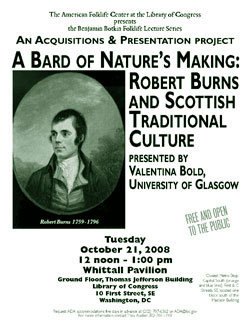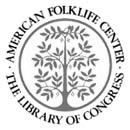| |
|||
|
|
The American Folklife Center at the Library of Congress October 21, 2008 Event Flyer "A Bard of Nature's Making":
|

|
The work and life of Robert Burns is of huge significance to folklorists, both in his Scotland, and internationally. In terms of engagement with traditional culture, Burns is best known for one song: the anthem "Auld Lang Syne" of 1788, now in circulation from Coatbridge to China. Equally, his lyrics, from "A Red, Red Rose" to "Peggy" (better known as "Westlin Winds"), are part of the international repertoire, along with the political commentaries like "A Man's a Man for A' That" and "The Slave’s Lament." Burns’s use of traditional cultural elements in his own work — from the calendar customs and related beliefs of "Halloween" to the supernatural practices of "Tam O' Shanter" — give his work depth and resonance.
Valentina Bold convenes a unique postgraduate degree in Robert Burns Studies, at the University of Glasgow's Dumfries campus. Here, she explores the precise ways in which Burns's work draws on, and influences, the traditional culture of Scotland. She looks, for instance, at his engagement with traditional songs (lyric songs in particular) through his work as a collector and improver in James Johnson's Scots Musical Museum (1787-1803) and George Thomson's Select Scottish Airs (1793). Equally, she pays attention to Burns's collection and composition of sexually explicit material for the posthumously published manuscript of The Merry Muses of Caledonia (1799), compiled by the drinking club The Crochallan Fencibles. Bold has recently completed a new edition of this volume, based on the 1959 edition by James Barke, Sydney Goodsir Smith and John De Lancey Ferguson. This is soon to be published by Edinburgh’s Luath Press with new illustrations by Bob Dewar.
Bold also considers the impact of Burns’s image as a self-styled "Bard of Nature's Making" on responses to himself, and to the ways in which he was considered and emulated by later Scottish poets and songwriters. The image of the "Heaven-taught ploughman" — in itself drawing on the work of earlier writers like Allan Ramsay and James Macpherson of Ossian fame — played a hugely significant role in validating and facilitating the work of other Scottish "peasant poets." Here, Bold draws on her recent study of James Hogg: A Bard of Nature's Making (Oxford: Peter Lang, 2007), to explore the creation of the self-taught stereotype. The lecture will consider Burns's impacts on other Scottish bards "of Nature's making" including James Hogg ("the Ettrick Shepherd") and Allan Cunningham ("the Nithsdale Mason").
Drawing on interviews she has conducted over many years, including discussions with prominent Scottish singers and cultural players, Bold will suggest the ways in which Burns is important to Scots in the twenty-first century, as part of their living cultural heritage. Sheena Wellington, for instance, suggests that Burns's fundamental importance is in the high quality of his work — "the most beautiful and direct poetry and songs" (more important than his political and cultural significance) along with his "wide sympathy" — from the sentimentalism of “To A Mountain Daisy” to the wry knowingness and condemnation of gendered hypocrisy in "Wha'll mow me noo" and the deeply personal resonances of many of his songs for their performers and audiences. Jo Miller, too, draws attention to the "human stories" which feature enduringly in Burns's work, along with the "timeless ideas of freedom and justice" which have all ensured the continuity of his cultural creations in Scotland and beyond. Shirley Bell, Chief Executive of the Robert Burns World Federation, goes even further: "In a nation feeling its roots slipping away I believe he kept and continues to keep the flame of patriotism burning. In today's world his works inspire poets, songwriters and dare I say — Politicians!"
In the run up to the 250th anniversary of his birth — Scotland's 2009 "Homecoming Year" — Burns is certainly increasingly linked, in a political context as well as by the tourism agencies, to appreciations of Scotland and of its traditions. For instance, for Alex Salmond, Scotland's First Minister, currently preparing for Burns's 250th anniversary, Burns is "our national poet and cultural icon...whose message of friendship and "Auld Lang Syne" lives on.... Burns is the inspiration behind our year-long celebration of some of Scotland's great contributions to the world: Golf, Whisky, The Enlightenment and Innovation, Burns himself and our rich culture and heritage." (See http://www.worldburnsclub.com/ ![]() ).
).
Of course the annual celebrations around Burns — a cultural phenomenon of their own—symbolically reinforce the cultural endurance, and commercial potential, of Burns as a Scottish stereotype and as a songmaker. Bold will also touch on the cultural phenomenon around Burns, including the Suppers, societies, clubs and, for academics, the conference series. Global Burns 2009 will play a major role in this respect, and Bold will finish by discussing the significance of the plans to celebrate Burns's work next year, at the local, national and international levels. (See http://www.gla.ac.uk/globalburnsnetwork/ ![]() )
)
Valentina Bold
University of Glasgow
September 2008
Valentina Bold is Head of Scottish Studies at the University of Glasgow's Dumfries campus. Robert Burns spent his final years in Dumfries, and Bold is part of the BARD team there (Burns Research in Dumfries). She convenes the taught postgraduate M.Litt programme in Robert Burns Studies, as well as the M.Litt in Scottish Cultural Heritage. She is known for her work on Scottish poetry and song, and she has a particular interest in the Scottish communities of the U.S. and Canada. Bold’s publications include James Hogg: A Bard of Nature’s Making and Smeddum: A Lewis Grassic Gibbon Anthology, as well as the CD-ROM Northern Folk: Living Traditions of North East Scotland. She is currently working on a new edition of Burns's Merry Muses of Caledonia, to be published in late 2008.

The American Folklife Center was created by Congress in 1976 and placed at the Library of Congress to "preserve and present American Folklife" through programs of research, documentation, archival preservation, reference service, live performance, exhibition, public programs, and training. The Center includes the American Folklife Center Archive of folk culture, which was established in 1928 and is now one of the largest collections of ethnographic material from the United States and around the world. Please visit our web site.
| ||||
